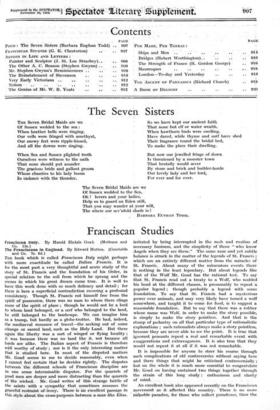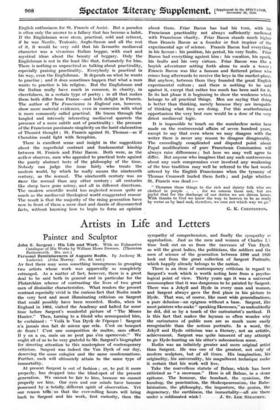Franciscan Studies
Tim book which is called Franciscan Italy might perhaps with more exactitude be called Italian Francis. It is for the most part a very thoughtful and acute study of the story of St. Francis and the foundation of his Order, in special relation to the soil from which he sprang and the scenes in which his great dream came true. It is well to have this work done with so much delicacy and detail ; for there is here a superficial contradiction covering a profound consistency. Though St. Francis cut himself free from the spirit of possession, there was no man to whom there clings more of the spirit of place ; though he would not be a lord to whom land belonged, or a serf who belonged to the land, he still belonged to the landscape. We can imagine him as a tramp, but hardly as a globe-trotter. He had, indeed, the mediaeval romance of travel—the seeking out of some strange or sacred land, such as the Holy Land. But there again the liberty was a sort of winged or flying locality ; it was because there was no land like it, not because all lands are alike. The Italian aspect of Francis is therefore will worthy of study ; nor is it the only interesting matter tliat is studied here. In most of the disputed matters Mr. Goad seems to me to decide reasonably, even when I cannot feel certain that he decides rightly. The disputes between 'the different schools of Franciscan discipline are in one sense interminable disputes. For the quarrels of good men are deeper and more distracting than the quarrels of the wicked. Mr. Goad writes of this strange battle of the saints with a sympathy that sometimes assumes the graceful restraint of-irony. There is an excellent passage in this style about the cross-purposes-between a-man -like Elias. irritated by being interrupted in the rush and routine of necessary business, and the simplicity of those " who know Angels when they see them." The same sane and yet subtle balance is struck in the matter of the legends of St. Francis ; which are an entirely different matter from the miracles of St. Francis. About many of the miraculous events there is nothing in the least legendary. But about legends like that of the Wolf Mr. Goad has the rational test. To say that St. Francis read out a treaty to a Wolf, who nodded his head at the different clauses, is presumably to repeat a popular legend ; though probably a legend with some foundation. To say that St. Francis had a mysterious power over animals, and may very likely have tamed a wolf somewhere, and taught it to come for food, is to suggest a reasonable foundation. But to say that there was a robber whose name was Wolf, in order to make the story possible, is simply to make the story pointless. And that is the stamp of pedantry on all that particular type of rationalistic explanations ; such rationalists always make a story pointless, because they are never able to see the point. It is true that ignorant peasants repeat a real and remarkable event with exaggerations and extravagances. It is also true that they would not repeat it at all if it was not remarkable.
It is impossible for anyone to steer his course through such complications of old controversies without saying here and there things that might be criticized controversially ; but on the whole it is much more essential to congratulate Mr. Goad on having sustained two things together through the strain of this long study : enthusiasm and clarity of mind..
An excellent book also appeared recently on the Franciscan movement as it affected this country. There is no more palpable paradox, for those who collect paradoxes, than the
English enthusiasm for St. Francis of Assisi. But a paradox is often only the answer to a fallacy that has become a habit. If the Englishman were stern, practical, cold and reticent, if he was Nordic, Teutonic, Anglo-Saxon and all the rest of it, it would be very odd that his favourite mediaeval character was a vivacious Italian beggar, with mad and mystical ideas about the beauty of beggary. Only the Englishman is not in the least like that, fortunately for him. There is nothing so unpractical as talking about practicality, especially praising practicality. Everybody is practical in his way, even the Englishman. ' It depends on what he wants to practise and it does sometimes happen that what a man wants to practice is his religion. But the Englishman and the Italian really have much in common, in charity, in cheerfulness, in a certain type of poetry ; in all that makes them both differ from France—and both delight in Francis. The author of The Franciscans in England can, however, show more material evidences, even in connexion with what is more commonly called practical. He traces through the tangled and intensely interesting mediaeval quarrels the presence of a more subtle sort of practicality : the pressure of the Franciscan passionate simplicity on the lucid elaboration of Thoinist thought ; St. Francis against St. Thomas—as if Cherubim could fight with Seraphim.
There is excellent sense and insight in the suggestions about the superficial contrast and fundamental kinship between St. Francis and Friar Bacon. Both were, as the author observes, men who appealed to practical tests against the purely abstract tests of the philosophy of the time. Nobody can judge the issue fairly • who treats the modern world, by which he really means the nineteenth century, as the normal. The nineteenth century was no more the normal than any other century ; all centuries like sheep have gone astray, and all in different directions. The modem scientific world has neglected reason quite as much as the mediaeval theological world exaggerated reason- The result is that the majority of the rising generation have now in front of them a mere dust and dazzle of disconnected facts, without knowing how to begin to form an opinion about them. Friar Bacon has had his turn, with his Franciscan practicality not always sufficiently mellowed with Franciscan charity. Friar Bacon stands much higher than Francis Bacon as a founder or first inspirer of the experimental age of science. Francis Bacon had everything in his favour.: his position, his period, his very faults. - Friar Bacon had everything against him : his vocation, his epoch, his faults and his very virtues. Friar Bacon was like a boyish adventurer setting forth alone to scale a tower ; Francis Bacon was like a famous and flattered prince who comes long afterwards to receive the keys in the market-place. But anyhow, between them they founded the great English experimental culture ; and there is nothing to be said against it, except that rather too much has been said for it. In its last phase it is beginning to show the weakness which belongs to all practical things. Men are saying that doing is better than thinking, merely because they are incapable of thinking what they are doing. For this scatterbrained opportunism the very best cure would be a dose of the very driest mediaeval logic.
It is impossible to "touch on the numberless notes here made on the controversial affairs of seven hundred years, except to say that even where we may disagree with the writer there is never any reason to disagree disagreeably. The exceedingly complicated and disputed point about Papal modifications of pure Franciscan ComMunism will always raise differences ; but here we may well agree to differ. But anyone who imagines that any such controversies about any such compromises ever involved any weakening of the true tradition may well be referred to the last words uttered by the English Franciscans when the tyranny of Thomas Cromwell hurled them forth ; and judge whether St. Francis was dead :—
" Threaten these things to the rich and dainty folk who are clothed in purple . . . for we esteem them not, but are joyful that for the discharge of our duties we are driven hence. With thanks to God we know the way to heaven to be as ready by water as by land and, therefore, we care not which way we go."
G, K. CIIESTERTON.































































 Previous page
Previous page